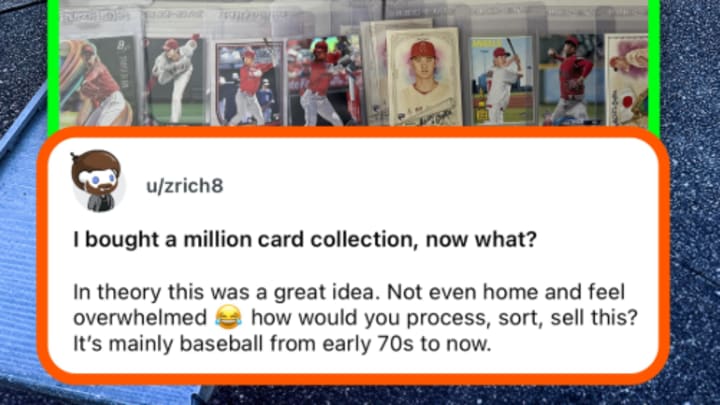I Just Bought a Million-Card Collection: Now What Do I Do? (Here's A Guide)

In this story:
Walter Payton's 1976 Topps #148 RC Rookie Card Fetches Impressive Price on Ebay
Imagine the thrill of acquiring a massive, million-card collection spanning decades of baseball history! That’s exactly the position one lucky collector finds themselves in after making a jaw-dropping purchase. According to a Reddit post detailing the collection, that consists of mainly baseball cards from the early 1970s to the present day, with the tantalizing possibility of hidden treasures waiting to be unearthed. Yet, amid the excitement lies the inevitable question: Where does one even start?
Let’s break down the potential gems, the strategic step-by-step process I’d employ, and the opportunities that lie within this overwhelming yet thrilling haul.
This collector bought a ONE MILLION CARD collection without knowing what was inside and is now finding tons of key rookie cards... pic.twitter.com/Ojn58UtSd6
— Topps (@Topps) January 6, 2025
The Most Impressive Ken Griffey Jr. Collection in the World
What Treasures Might Be Hidden in This Collection?
A collection with such an impressive volume and a focus on the 1970s presents an exciting opportunity to uncover key rookie cards and vintage gems. While the specifics remain a mystery, here are a few potential cards that could make this collection a jackpot:
1. 1973 Topps Mike Schmidt Rookie Card (#615): A true grail for collectors, this card features one of baseball’s greatest third basemen. In excellent condition, it can fetch significant value.

2. 1975 Topps George Brett Rookie Card (#228): Known for its vibrant design, Brett’s rookie is iconic and a must-have for vintage collectors.

3. 1975 Topps Robin Yount Rookie Card (#223): Another gem from the 1975 set, Yount’s rookie is a cornerstone of any 1970s collection.

Old Baseball Cards on Twitter: Here are Ten Vintage Accounts to Follow
With a collection of this magnitude, other Hall of Fame rookies, stars, and set completions from the era could also be in the mix, making every box a potential treasure chest. Here’s a step-by-step guide of what I’d personally do in a situation such as this:
Step 1: Set Up a Strategy
With one million cards, diving in without a plan can lead to chaos. Instead, break the task into manageable steps:
• Create a Workspace: Find a space to sort and organize—whether it’s a garage, basement, or dedicated room. Make sure it’s clean and free of humidity to protect the cards.
• Gather Supplies: You’ll need boxes, dividers, penny sleeves, and top loaders to organize and protect valuable cards. A magnifying glass and reference guide or app for card identification will also come in handy.
Step 2: Start Sorting
The best way to approach a collection this size is by sorting in layers:
• Era: Start by dividing the cards into decades (1970s, 1980s, etc.).
• Sets or Players: Group cards by year, set, or notable players. This will help identify valuable pieces and complete sets.
• Condition: Look for cards in excellent condition, as this significantly impacts their value.
Step 3: Research Values
Once the sorting is underway, research key cards using tools like PSA’s population report, eBay’s sold listings, or price guides such as Card Ladder or Beckett. Keep an eye out for high-value rookies and stars, especially cards in excellent condition.
Step 4: Decide What to Keep or Sell
After identifying the most valuable pieces, decide on your priorities:
• Keep: Hold onto sentimental favorites or cards with high potential for appreciation.
• Sell: Consider selling duplicates or less-desirable cards through platforms like eBay, COMC, or local card shops. Grouping cards into lots by player or team can appeal to targeted buyers.
Step 5: Enjoy the Journey
Sorting through such a vast collection can be overwhelming, but it’s also an incredible opportunity to rediscover history and uncover hidden treasures. Take it one box at a time, and enjoy the process of connecting with the hobby.
The Hobby Impact
This million-card purchase reflects the resurgence of enthusiasm in the card-collecting community. High-profile acquisitions like this inspire others to explore their collections, dig into vintage sets, and perhaps even take on ambitious projects. With patience, research, and organization, this collector has the potential to turn their overwhelming haul into an enviable collection or a profitable venture.
So, where would you begin if this collection landed in your lap? Whatever the strategy, one thing is certain: the adventure of discovery is priceless!

Passionate sports card collector and writer based in Queens, NY. Lifelong fan of the New York Mets, Jets, and Rangers. Covering sports cards and collectibles with deep industry knowledge and enthusiasm, while bringing a fresh perspective to the ever-evolving hobby world on http://SI.com/collectibles.
Follow MJSchilling